GOP Narrows Issues Gap

Republicans have made considerable headway over the past two years in cutting into the Democrats’ issues advantage. The public now rates the two parties about even for their ideas on taxes, education and the global economy. The Democrats narrowly led the GOP on global economic issues in January 1999 (38%-33%) and held a substantial advantage on taxes and education.
Democrats maintain their edge as having the best ideas on health care and retirement programs. Health care has long been a Democratic strong suit, and Pew surveys throughout the presidential campaign showed that Al Gore held the edge over Bush as being better able improve the health care system and make prescription drugs more affordable for seniors. The Democrats are seen as having the best ideas on regulating HMOs, as well as securing Social Security, although by decreased margins since January 1999. On prescription drugs, which was not included on the 1999 survey, the Democrats hold a 19-point lead (49%-30%).
For their part, Republicans have expanded their substantial lead as the party having the best ideas to improve the nation’s moral climate. The public currently favors the GOP by a nearly two-to-one margin (49%-26%), and even a substantial number of Democrats (28%) say Republicans have the best ideas on this issue. Independents favor the GOP on morality 48%-21%.
Gridlock Ahead?
Despite the pledges of bipartisanship coming from Washington, half of Americans expect an increased level of bickering from Republicans and Democrats, compared to 41% who believe the two parties will work together.
Republicans are far more optimistic than Democrats about prospects for comity; 51% of Republicans believe partisan cooperation will prevail, while 41% see signs of strife. Democrats, by a wide margin (56%-34%), predict more bickering, as do independents (by 54%-39%).
Congress and its leaders have improved their image in recent months. Currently, 43% of the public approves of the performance of GOP leaders, while 37% disapprove. That is a turnaround since July, when 36% liked the job GOP leaders were doing and 46% disapproved. Similarly, Congress’ overall favorability is up slightly, with 64% having generally positive impressions of Congress, while 23% hold a negative opinion. In a September survey of registered voters, 61% had at least mostly favorable views of Congress while 32% had largely unfavorable views.
The public has a fairly high level of awareness concerning the close partisan division on Capitol Hill. A solid majority (59%) knew that as a result of the elections, Congress is more narrowly divided, while just 16% said, incorrectly, that the GOP had increased its majority.
Military, Business Seen as Benefitting
The public has clear ideas about what the transfer of power in Washington will mean for various groups. And the public’s assessment of likely winners and losers in the Bush administration is vastly different than its list for the Clinton administration eight years ago.
In the public’s mind, the military and business corporations will be the hands down winners in the Bush era. More than seven-in-ten Americans (72%) believe the military will gain influence in the coming years, while just 4% say it will lose influence. By a better than seven-to-one margin (66%-9%), the public expects corporations to benefit under the Bush presidency.
Half of Americans (51%) think that conservative Christians, who supported Bush by a wide margin, will gain influence while just 11% say they will lose clout. A bare majority, too, predicts children will gain, but that is far less than the ten-to-one margin that held that view at the start of the Clinton administration. And Washington lobbyists — who were widely seen as being on the outs when Clinton arrived — also are regarded as winners, by a two-to-one margin (35%-17%).
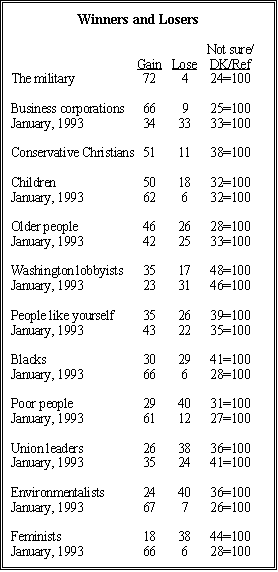
On the flip side, sizable pluralities think that feminists, environmentalists, union leaders and the poor — all traditionally identified with the Democratic Party — will lose influence. All of these groups were seen as gaining influence when Clinton took over in 1993. Older Americans, however, are predicted to fare well in the Bush era by a slightly bigger margin than in 1993.
Interestingly, the public has a mixed view about how African-Americans — who were seen as clear winners eight years ago — will fare under Bush. While whites, by a modest 31%-27% margin, believe that blacks will gain, blacks themselves are far more pessimistic. By better than two-to-one (51%-24%), most blacks believe they will lose influence, rather than gain influence, under Bush.
When asked how “people like yourself” will fare, a modest plurality (35%) thinks the Bush era will be positive, but more people had a favorable outlook for the Clinton administration eight years ago. There are stark partisan differences on this question; six-in-ten Republicans say people like them will gain influence, compared to just 5% who say they will lose clout. Democrats, by better than a two-to-one margin (44%-18%), believe they will lose, rather than gain, influence.
While the public believes evangelical Christians will gain influence under Bush, so too do members of that group. Nearly half of evangelical Christians (48%) say people like them will expand their influence, while just 16% believe they will lose influence. A plurality of seculars (42%), by contrast, see people like themselves losing clout.
Solid pluralities of Americans with incomes over $50,000 and those living in the South and West are confident they will gain influence. Those with incomes of less than $20,000 and those living in the East and Midwest are divided over whether people like themselves will gain or lose clout.
Powell’s Popularity
Colin Powell has been an extraordinarily popular figure since the Persian Gulf War. And as he prepares for confirmation hearings as Bush’s nominee for Secretary of State, his overall favorability ratings are approaching the high level he received shortly after that conflict, nearly a decade ago.
Overall, Powell is viewed very favorably by 45% of the public with another 35% holding a mostly favorable impression of the retired general. When the sample is limited to those who can rate Powell, his favorability reaches 90% (50% very favorable, 40% mostly favorable).
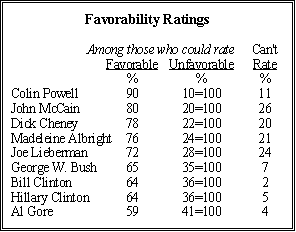
Powell’s popularity cuts across political and demographic categories, but Republicans hold a much more favorable view of him than do Democrats. Based on those who could rate him, nearly two-thirds of Republicans (64%) have a very favorable impression of Powell, compared to 39% of Democrats.
John McCain, who vied with Bush for the GOP presidential nomination, remains personally popular with the public, although more than a quarter (26%) say they can’t rate the Arizona senator. Eight-in-ten of those who could rate McCain have a favorable impression of him.
The outgoing Secretary of State, Madeleine Albright, remains widely popular, especially among those who can rate her. And although Joe Lieberman’s overall favorable rating of 55% is slightly below Al Gore’s rating of 57%, Lieberman’s favorability among those who can rate bests Gore’s, 72%-59%. While as popular as Gore among Democrats, Lieberman draws much higher ratings than Gore among Republicans and independents.
Divisions Over the Court
The military, which traditionally has garnered high favorability ratings, continues to be quite popular. More than eight-in-ten Americans hold at least mostly favorable views of the nation’s armed forces, which is down from the 89% rating the military received in August 1999.
Following the Supreme Court’s controversial ruling in the Florida recount case the Court’s favorability has declined a bit. About two-thirds (68%) have favorable impressions of the Court, compared to 77% in October 1997. While eight-in-ten Republicans hold positive views of the Court, just 61% of Democrats and 69% of independents agree.
The GOP is now on par with the Democrats in terms of favorability; 56% of the public has a favorable impression of the GOP, almost even with a 60% rating for the Democrats. Republicans have made significant gains since the end of Clinton’s impeachment trial in February, 1999, when fewer than half of Americans had positive feelings about the party.
Divided Judgment
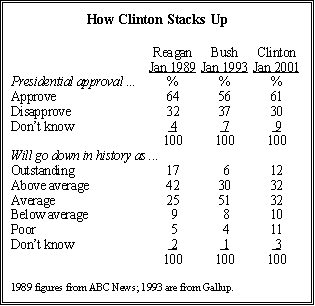
As has been the case for much of his presidency, the American public is of two minds about Bill Clinton. While his favorability ratings are near an all-time high and his approval ratings remain strong, an overwhelming majority of Americans think he will be most remembered for the scandals that have plagued his administration.
Clinton’s job approval rating is comparable to Ronald Reagan’s at a similar point in his presidency (64% in January 1989) and slightly higher than George Bush’s 56% rating as he prepared to leave office. A majority of Americans in nearly every major demographic group now approve of the way Clinton is doing his job. Among his biggest admirers are blacks, younger people and the less affluent.
More than six-in-ten independents (63%) approve of the job he is doing, as do more than one-third of Republicans (35%). Conservative Republicans remain Clinton’s toughest critics. Only 27% approve of the job he’s doing, while 70% disapprove. Moderate to liberal Republicans narrowly approve of Clinton (48% vs. 42% who disapprove).
On balance, Americans think history will view Clinton positively: 44% say he will go down in history as an outstanding or above average president, 32% say he’ll be viewed as average, and 21% say below average or poor. When compared to Reagan and Bush, Clinton is clearly the most polarizing figure in the group. In January 1993, nearly six-in-ten Americans said Reagan would go down in history as an outstanding or above average president, 25% said average and 14% said below average or poor. Most Americans (51%) said Bush would go down in history as an average president.
Not surprisingly, Republicans and Democrats have starkly different opinions about how Clinton will be remembered. Only 28% of Republicans say he’ll go down in history as an outstanding or above average president. This compares with 62% of Democrats. Fully one-in-five Republicans say history will view Clinton as a poor president, compared to only 3% of Democrats.
Most Recall Scandals

Beyond these broad evaluations, the public is clearly conflicted about Clinton’s legacy. By a better than two-to-one margin, Americans say in their own view Clinton’s accomplishments will outweigh his failures. However, by an even wider margin, they say he will be remembered by others more for impeachment and scandals than for his accomplishments as president.
Again, Republicans and Democrats don’t agree on Clinton’s legacy. Republicans are evenly divided on the question of whether the president’s accomplishments will outweigh his failures or vice versa, while a strong majority of Democrats (77%) say his accomplishments will matter most. But majorities of Republicans, Democrats and independents agree that Clinton will be remembered more for scandals than for his accomplishments as president (79%, 53% and 68%, respectively).
The Monica Lewinsky scandal and ensuing impeachment is what comes to mind when Americans are asked specifically what Clinton will be remembered for. In an open-ended question, fully 74% cited Clinton’s scandals or personal problems as his main legacy, with 43% citing the Lewinsky scandal. Even among Democrats, scandal is the first thing that comes to mind when they think of Clinton. More than two-thirds say he’ll be remembered most for this aspect of his presidency.
While references to Clinton’s policy achievements are largely overshadowed by recollections of scandals, he does get some credit for his efforts to strengthen the economy. Some 14% cite the economy when asked what Clinton will be most remembered for. Another 6% mention his efforts at peace in the Middle East and elsewhere around the world. Only 1% mention domestic policy achievements other than the economy.
Economy vs. Morality
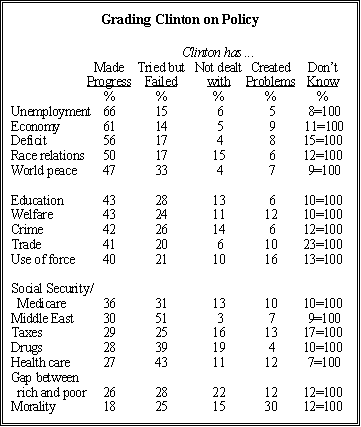
Overall, Clinton receives high marks for his attempts to deal with the nation’s problems. A slim majority (52%) say he has made progress toward solving the major problems facing the country, another 27% say he has tried but failed. Only 15% say he has not addressed these problems or made matters worse.
In terms of specific policy areas, Clinton receives the highest marks for his economic policies. A majority of Americans say he has made progress on unemployment (66%), economic prosperity (61%) and the budget deficit (56%).
Roughly half say he’s made progress on race relations (50%) and world peace and stability (47%). In addition, sizable minorities give him credit for making progress on education (43%), the welfare system (43%), crime (42%), trade policy (41%), and the proper use of American military forces around the world (40%).
He gets less praise for his efforts on Social Security and Medicare, the Middle East, taxes, drugs, health care, and reducing the gap between rich and poor (an area which 22% of Americans say he did not deal with at all). He does get credit for trying on the Middle East and on health care; 51% and 43% respectively, say he tried but failed to deal with these problems. Clinton gets his lowest marks for morality. Only 18% say he made progress in solving this national problem. Nearly a third (30%) say he actually created problems for the next president.
Hillary’s Comeback
As she winds up her duties as First Lady and embarks on a new career in the U.S. Senate, Hillary Clinton is enjoying a surge in her own popularity. Six-in-ten Americans now have a favorable opinion of her, up substantially from 49% last year. Mrs. Clinton’s ratings have fluctuated throughout her husband’s presidency, hitting a low point of 42% favorable early in 1996 amid charges of possible misconduct related to the Whitewater case. Her personal ratings rebounded during the Monica Lewinsky scandal of 1998, but fell again in 2000.
The gender gap in opinion of Mrs. Clinton has sharpened somewhat. In May 2000, 44% of men had a favorable opinion of her compared to 54% of women. Today 51% of men view her favorably versus 68% of women.
Cabinet Earns Fair Grades

Partisan patterns are evident in the divergent views of President-elect Bush’s cabinet and his performance to date in promoting his programs. While Republicans applaud Bush’s recruitment of figures from past Republican administrations, Democrats think this is a bad thing, not a good thing, by a 48% to 38% margin. Still, Democrats approve of Bush’s cabinet choices (44%-23%), and independents approve of Bush’s picks by an even wider margin (58%-15%).
With respect to the ideology of the appointees, one-third of Democrats and a quarter of independents think Bush’s appointments are too conservative. When partisans are further divided by whether they consider themselves to be conservative, moderate, or liberal, these disparities become even more apparent. Fully 57% of liberal Democrats think Bush’s cabinet is too conservative, compared to just 21% of more moderate and conservative Democrats.
But the partisan split over Cheney’s role is somewhat less pronounced. As many Democrats (20%) believe he has too little influence as say he has too much. And better than four-in-ten Democrats (and 57% of independents) say the former defense secretary is exercising an appropriate level of influence.
Less Interest in Cabinet – Except Powell
Overall, public attention to Bush’s cabinet appointments is lower than it was for the Clinton transition eight years ago. Just 58% say they are following Bush’s cabinet choices very or fairly closely, compared to 66% who said that at this stage in the Clinton transition of 1993. However, more than twice as many Americans (43%) can name a member of Bush’s incoming cabinet than could name a single cabinet or other major appointment made by President-elect Clinton in January of 1993 (21%).
The difference is simple — Colin Powell. While one-in-three can identify Powell as a Bush appointee, only 18% can name any of the rest of Bush’s appointees combined. John Ashcroft comes in a distant second to Powell with 8% recalling his name. By comparison, the most recognized figure in Clinton’s 1993 cabinet was Lloyd Bentsen at 8%.
Residents of the Midwest do slightly better at identifying Bush’s cabinet appointments — possibly because they are more familiar with local politicians like Ashcroft, Tommy Thompson and Spencer Abraham who have landed cabinet posts. African-Americans are just as likely as whites to identify Colin Powell or Condoleezza Rice as Bush appointees, but only 5% name any others, compared to 18% of whites.
Those who are able to name one or more cabinet appointments express greater satisfaction with Bush’s choices than those who cannot by a 69% to 51% margin. While Republicans are more apt to know the names of Bush’s nominees than are Democrats, approval of the appointments is linked to familiarity even when party affiliation is taken into account.
Bush’s Tough Sales Job
So far, Bush has been more successful with his cabinet picks than in selling his agenda. While half approves of the way he has explained his policies and plans for the future, the other half either actively disapproves (36%) or isn’t sure (14%).
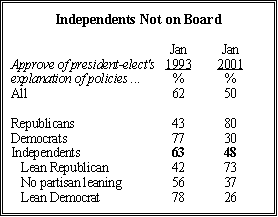
Bush’s lagging approval on this aspect of his transition reflects particularly low marks from Democrats and independents. Democrats clearly are not giving Bush much of a honeymoon, but neither are independents. In 1993, 63% of independents approved of Clinton’s job explaining his agenda, compared to only 48% who approve of Bush’s performance so far. Independents who lean toward one of the parties tend to show attitudes very similar to those who identify themselves as partisans outright.
A majority of Americans (58%) say it is too early to tell if Bush will be a successful president. Of the rest, 26% (mostly Republicans and independents who lean Republican) predict Bush will be successful, and 15% (mostly Democrats and Democratic leaners) believe he will be unsuccessful. Either because of his performance to date, or because the job is easier, slightly more think that Dick Cheney will be successful as vice president than think Bush will be successful as president. Nearly a third predict success for Cheney, only 7% foresee failure.
While nearly half of the public sees Bush being pulled to the right, much of that sentiment is being driven by liberal Democrats and African-Americans. Each group, by a better than two-to-one margin, says Bush is listening more to conservatives, not moderates in his party. Republicans tend to see Bush’s ideological tendencies as similar to their own. Republicans who think of themselves as conservative believe that Bush is listening more to conservatives (53%-34%). Moderate and liberal Republicans tend to think Bush is listening to the more moderate members of his party by a 58% to 25% margin.
More Bears, Fewer Bulls
The increase in economic pessimism has occurred across all segments of the population, but has been particularly pronounced among women and African-Americans, where there was more than a threefold increase in the proportion who think things will get worse for them over the next year (women from 10% to 31%, blacks from 12% to 39%).
This trend also has a large partisan component. Democrats are twice as likely as Republicans (36% to 18%) to be pessimistic about their immediate economic prospects, with independents falling somewhere in between. By comparison, two years ago Democrats were slightly more optimistic about their immediate economic future than Republicans.

Concern about the economy over the next year is even more noticeable with respect to the public’s mixed view of the stock market. Nearly as many Americans expect the market to go down (30%) as up (34%) over the next 12 months. This represents a distinct shift from late 1997, when the “bulls” outnumbered the “bears” by two-to-one (32% to 16%).
Wealthier Americans are significantly more optimistic on this issue than those of more moderate means. Respondents from households earning at least $50,000 annually predict that stocks will go up, not down, by a margin of 43% to 28%. By comparison, those in households earning under $50,000 are split, with 31% bullish and 33% bearish.
At the same time that many people express short-term concerns about the upcoming year, there are signs that Americans remain confident with their long-term economic prospects and the general direction of the country. General satisfaction with the state of the nation is up, from 47% last June and 51% in September to 55% today. The increase has been across the board, with particularly notable gains among retirees, political independents and those living in the East. Moreover, 76% of working Americans say they either make enough money to lead the kind of life they want, or think they will be able to in the future, a proportion that has remained remarkably steady over the past decade.
Winter Weather Tops News Interest Index
Cold winter weather was the most closely followed news story this month. More than four-in-ten Americans (42%) followed this story very closely. Attentiveness to this story is on par with winter weather-related news in previous years. Not surprisingly, those living in the East and Midwest, where many of the storms occurred, paid the most attention to the story, while those in the West were less interested.
The survey shows an uptick in interest in economic news. Nearly a third of Americans (32%) followed reports about the condition of the U.S. economy closely this month. Public attentiveness to economic news is the highest it has been since May 1994, before the psychological impact of the economic recovery had really taken hold. College graduates and those in the highest income bracket followed this story more closely than others.
Renewed efforts at reaching a peace agreement in the Middle East gained the very close attention of 21% of the public this month. Interest in the Middle East peace process has remained remarkably stable over the years, with roughly one-in-five Americans paying very close attention and at least half following the story at least fairly closely.


